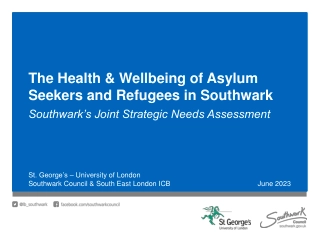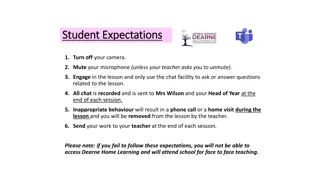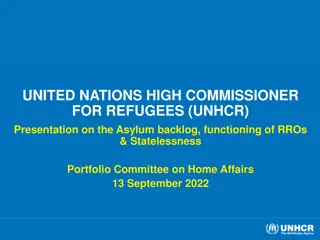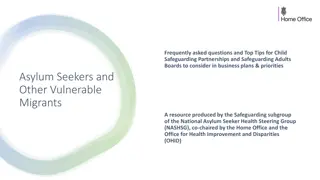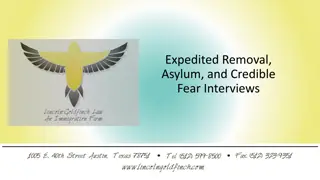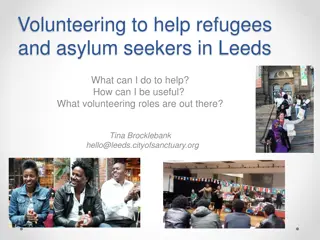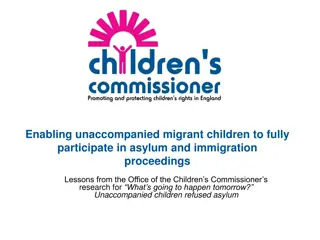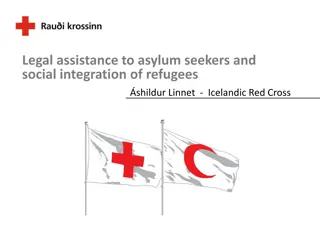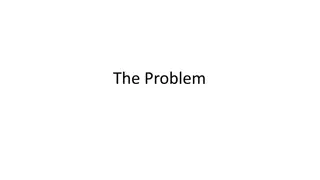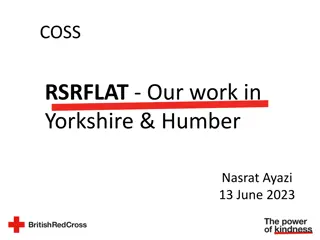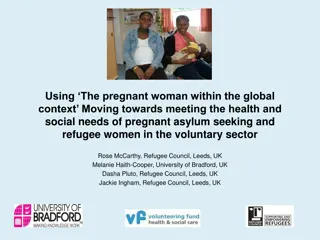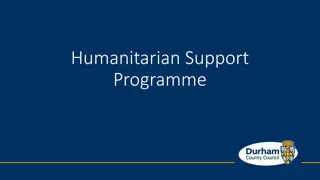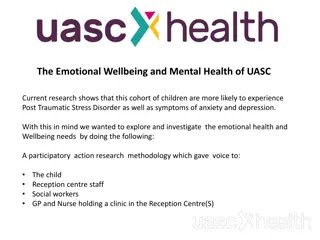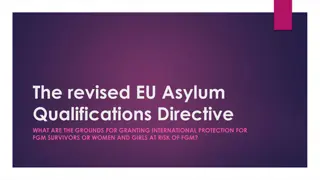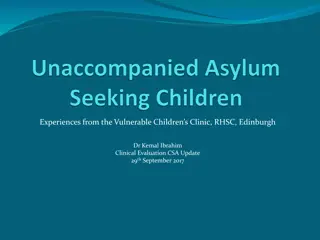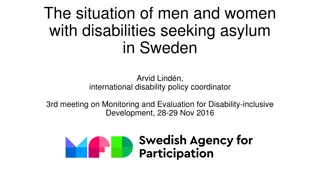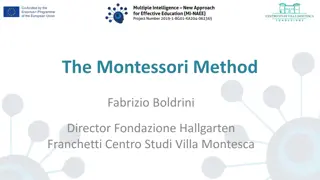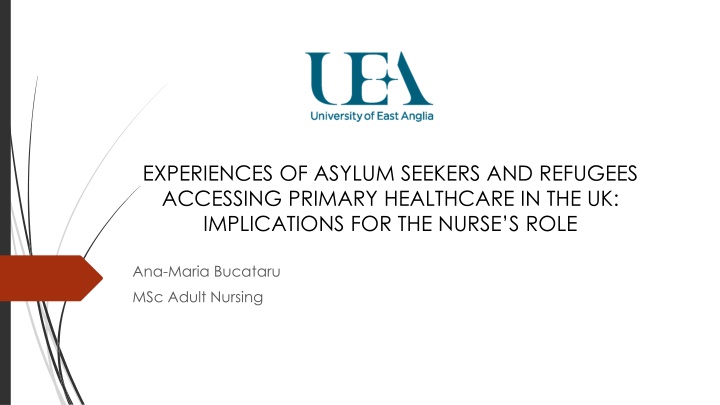
Experiences of Asylum Seekers in UK Primary Healthcare
Explore the experiences of asylum seekers and refugees accessing primary healthcare in the UK, implications for nursing roles, critical appraisal of available literature, and insights for practice. Comprehensive methodology, search strategy, and findings discussed.
Download Presentation

Please find below an Image/Link to download the presentation.
The content on the website is provided AS IS for your information and personal use only. It may not be sold, licensed, or shared on other websites without obtaining consent from the author. If you encounter any issues during the download, it is possible that the publisher has removed the file from their server.
You are allowed to download the files provided on this website for personal or commercial use, subject to the condition that they are used lawfully. All files are the property of their respective owners.
The content on the website is provided AS IS for your information and personal use only. It may not be sold, licensed, or shared on other websites without obtaining consent from the author.
E N D
Presentation Transcript
EXPERIENCES OF ASYLUM SEEKERS AND REFUGEES ACCESSING PRIMARY HEALTHCARE IN THE UK: IMPLICATIONS FOR THE NURSE S ROLE Ana-Maria Bucataru MSc Adult Nursing
Overview Aim of the Review Methods and Methodology Search Strategy Critical Appraisal Entitlements to healthcare Findings Results within wider literature Implications for practice
Aim of the review: To analyse the available literature from the UK to understand the experiences of ASR accessing primary healthcare. Specifically, this literature review explored experiences of a) ASR and b) of professionals working with this group of people.
Methods and Methodology: A critical interpretive synthesis was carried out. A comprehensive search on CINAHL Complete, Academic Search Complete, AMED - The Allied and Complementary Medicine Database, MEDLINE Complete, and PsycINFO and of grey literature resulted in the inclusion of 16 primary studies (13 qualitative, 2 mixed-methods articles and 1 quantitative article).
Search strategy Review question: What are the experiences of ASR accessing primary care in the UK? Key terms fitted in PICo which stands for Population, Issue, Context/ Comparison, Outcome (Aveyard, Payne, Preston, 2016). Population is ASR , issue is access to primary healthcare , context is the UK outcome is experiences
Prisma 2009 Flow Diagram Qualitative, mixed-methods and quantitative studies were incorporated in the review if they: (i) Included participants who were adult (over 18) asylum seekers and/or refugees (AS and/or R) living in the UK (England, Scotland or Wales); (ii) Were published in the English language between 2007- 2019; (iii) Explored the experiences of asylum AS and/or R accessing primary healthcare in the UK from the lens of ASR and/ or professionals working with ASR.
Critical Appraisal Overall, all studies had some methodological flaws due to their small sample size, recruitment strategies and the nature of data collection and data analysis. Most authors acknowledged these flaws when discussing the limitations of their studies, whilst some did not show enough reflexivity. Lastly, although studies looked at experiences of staff working with ASR, not many included nurses as participants, which may limit the applicability of this review to nursing practice.
Entitlements to healthcare for ASR For those AS waiting for a decision in the UK, the Government provides only 37.75 a week for each person in the household. AS are also entitled to free dental treatment, prescriptions and eye tests after they apply for a fee waiver, also called HC2 certificate AS In England: have to pay for secondary care In Scotland + Wales: free primary+ secondary care If an asylum case is rejected, any cash support ceases after 21 days (Bloch, 2013). Refused AS who meet certain criteria may receive 35.39 a week, redeemable at a limited number of shops through an Azure card (Nellums et al, 2018). In addition, the Government has introduced upfront charging for non-urgent care in 2015, deterring many refused AS from seeking care. Refused AS Free primary + secondary care The Government stops R financial support within 28 days, also referred to as the move on period (Strang, Baillot, Mignard, 2018). R
Findings: Care provision, Communication, Therapeutic relationship, Affordability and Cultural Competence are themes used to describe the barriers and facilitators professionals working with ASR experience when providing care. Their pairs refer to barriers and facilitators ASR experience
Care Provision Ability to access Many constraints exists when trying to provide care due to a lack of understanding about the asylum system and healthcare entitlements for ASR (Lindenmeyer et al, 2016a; Balaam et al, 2015). These findings were mirrored in the perspectives of ASR who reported being unable to register with a GP (O Donnell et al, 2008; Kang, Tomkow, Farrington, 2019). ASR lacked knowledge about the health system (O Donnell et al, 2007; Fang et al, 2015) and complained being dispersed in areas where reaching a GP would be hard (Fang et al, 2015; Nellums et al, 2018a). Lack of resources and time (Robinson, Masoscha, 2017; Lindenmeyer et al, 2016a), lack of training (Nellums et al, 2018a; Burchill, Pevalin, 2014), high workload (Guhan, Liebling-Kalifani, 2011) and client's high expectations (Guhan, Liebling-Kalifani, 2011) were also cited as barriers to care. Overall, ASR were dissatisfied with the slow paced health system, appointment system and treatment by reception staff The lack of continuity of care and of referral to specialists was seen as a barrier to accessing care (Fang et al, 2015; O'Donnell et al, 2007, 2008).
2. Communication and Ability to understand Both staff and ASR reported language was a major barrier encountered in practice. The use of interpreters = both a facilitator and barrier. At times, the language barriers resulted in the wrong treatment being given to patients (Fang et al, 2015; Kang, Tomkow, Farrington, 2019). Besides verbal barriers, ASR were dissatisfied with a person-centred approach, wanting GPs to take control instead of asking them what they thought was wrong (O Donnell et al, 2008). They were also dissatisfied by the fact that consultations did not involve touching, which was often the case in their home country(O Donnell et al, 2008).
Therapeutic relationship Ability to trust Staff mentioned it was difficult to maintain boundaries with ASR, especially when they lived in the same area or town (Lindenmeyer et al, 2016a; Guhan, Liebling-Kalifani, 2011). Regardless of participants birthplace, many mentioned a lack of trust in their GP. Lack of language, cultural understanding, use of computers, and brevity of consultations all impacted on the ability of ASR to trust staff (Fang et al, 2015; Kang, Tomkow, Farrington, 2019). Staff also felt they were ill-equipped in knowing how to build a therapeutic relationship with ASR (Balaam et al, 2015; Lindenmeyer et al, 2016a). Many ASR had no previous experience of primary care from their country of origin (Bhatia, Wallace, 2007).
4. Affordability and Ability to pay Staff talked about the lack of resources and heavy caseloads that left little time for appointments (Guhan, Liebling-Kalifani, 2011; Robinson, Masocha, 2017). They found the asylum system to be especially limiting and described how ASR were often unable to afford transport or medication (Robinson, Masocha, 2017; Balaam et al, 2015). ASR reported similar concerns, especially when having to pay for over the counter medication and prescriptions (Fang et al, 2015; Nellums et al, 2018a). Even with a HC2 Certificate, ASR were asked to pay for their medication (Kang, Tomkow, Farrington, 2019).
5. Cultural competence and cultural expectations It is important for staff not to make assumptions about culture A lack of training in cultural competence leads to issues when planning and delivering care. Disappointment in the delivery of care was the result of a mismatch between staff s provision of services and expectations of ASR (Century, Leavey, Payne 2007; Lindenmeyer et al, 2016).
References Apostolidou, Z., Schweitzer, R. (2017) Practitioners perspectives on the use of clinical supervision in their therapeutic engagement with asylum seekers and refugee clients , British Journal of Guidance and Counselling,45 (1), pp. 72-82. Apostolidou, Z. (2015) Politicised notions of professional identity and psychosocial practice among practitioners working with asylum seekers and refugees , British Journal of Guidance and Counselling,43 (4), pp. 492-503. Arshad, F., Haith-Cooper, M., Palloti, P. (2018) The experiences of pregnant migrant women in detention: A qualitative study , British Journal of Midwifery, 26 (9), pp. 591-596. Aveyard, H., Payne, S., Preston, N. (2016) A Postgraduate's Guide To Doing A Literature Review In Health And Social Care (1st edn). Berkshire: Open University Press. Baalaam, M. C., Kingdom, C., Thomson, G., Finlayson, K., Downe, S. (2015) We make them feel special : The experiences of voluntary sector workers supporting asylum seeking and refugee women during pregnancy and early motherhood , Midwifery,34, pp. 133-140. Bales, S., Sare, L. (2014). Refining Strategy: A Second Bid at Critical Interpretive Synthesis for Collection Building , Qualitative and Quantitative Methods in Libraries (QQML), 1, pp. 141-151. Barrington, A. J., Shakespeare-Finch, J. (2013) Working with refugee survivors of torture and trauma: An opportunity for vicarious post- traumatic growth , Counselling Psychology Quarterly, 26 (1), pp. 89-105. Basedow J, Doyle, L. (2016) Refugee CouncilEngland s forgotten refugees: Out of the fire and into the frying pan, Available at: https://www.refugeecouncil.org.uk/assets/.../England_s_Forgotten_Refugees_final.pdf (Accessed 04 April 2019). Beeres, D. T., Cornish, D., Vonk, M., Ravensbergen, S. J., Maeckelberghe, E. L. M., Van Hensbroek, P. B., Stienstra, Y. (2018) Screening for infectious diseases of asylum seekers upon arrival: the necessity of the moral principle of reciprocity , BMC Medical Ethics,19 (16), Available at: https://bmcmedethics.biomedcentral.com/track/pdf/10.1186/s12910-018-0256-7 (Accessed 20 April 2019). Bernardes, D., Wright, J., Edwards, C., Tomkins, H., Dlfoz, D., Livingstone, A. G. (2010) Asylums Seekers Perspectives on their Mental Health and Views on Health and Social Services: Contribution for Service Provision using a Mixed-Methods Approach , International Journal of Migration, Health and Social Care,6 (4), pp. 3-20. Betancourt, J., Green, A., Carillo, J. (2002) Cultural competence in health care: emerging frameworks and practical approaches. The Commonwealth Fund, Available at: https://www.commonwealthfund.org/publications/fund-reports/2002/oct/cultural-competence- health-care-emerging-frameworks-and (Accessed 22 April 2019).
Bhatia, R., Wallace, P. (2007) Experiences of refugees and asylum seekers in general practice: a qualitative study, BioMedical Central Open,8 (48), Available at: https://www.ncbi.nlm.nih.gov/pmc/articles/PMC2001193/ (Accessed 6 April 2019). Bloch, A. (2013). Living in fear: rejected asylum seekers living as irregular migrants in England , Journal of Ethnic and Migration Studies,40 (10), pp. 1507-1525. Burchill, J., Pevalin, D. (2014) Demonstrating cultural competence within health-visiting practice: working with refugee and asylum-seeking families , Diversity and Equality in Health and Care,11, pp. 151-159. Burchill, J., Pevalin, D. (2012) Barriers to effective practice for health visitors working with asylum seekers and refugees , Community Practice,85 (7), pp. 20-23. Care and Quality Commission (CQC, 2018) York Street Health Practice Inspection report 20/11/2018, Available at: https://www.cqc.org.uk/location/1-3705684815 (Accessed 22 April 2019). Century, G., Leavey, G., Payne, H. (2007) The experience of working with refugees: counsellors in primary care , British Journal of Guidance and Counselling,35 (1), pp. 23- 40. Dixon-Woods, M., Agarwal, S., Jones, D., Young, B., Sutton, A. J. (2005) Synthesising qualitative and quantitative evidence: a review of possible methods , Journal of Health Services Research and Policy,10 (1), pp. 45-53. Dixon-Woods, M., Cavers, D., Agarwal, S., Annandale, E., Arthur, A., Harvey, J., Hsu, R., Katbamna, S., Olsen, R., Smith, L., Riley, R., Sutton, A. J. (2006) Conducting a critical interpretive synthesis of the literature on access to healthcare by vulnerable groups , BMC Medical Research Methodology, 6 (35), Available at: https://doi.org/10.1186/1471-2288-6-35 (Accessed 26 April 2019). Gov.UK (2019a) Guidance NHS entitlements: migrant health guide, Available at: https://www.gov.uk/guidance/nhs- entitlements-migrant-health-guide (Accessed 11 March 2019). Immigration and Asylum Act 1999 (c33, part IV). Available at: https://www.legislation.gov.uk/ukpga/1999/33/section/95 (Accessed 04 April 2019). Robertshaw, L., Dhesi, S., Jones, L. L. (2017) Challenges and facilitators for health professionals providing primary healthcare for refugees and asylum seekers in high-income countries: a systematic review and thematic synthesis of qualitative research , British Medical Journal Open,7 (8), e015981, Available at: 10.1136/bmjopen-2017-015981 (Accessed 26 April 2019).

